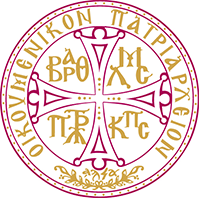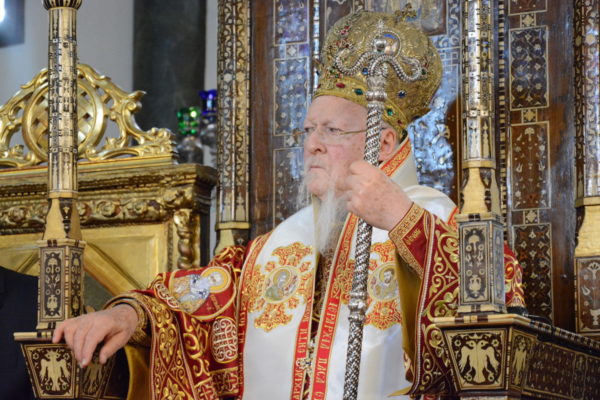
* * *
Your Excellency Archbishop and Archabbot Cirill,
Your Eminences, Excellencies and Graces,
Beloved Brothers and Sisters in the Lord,
We join with you today – in this magnificent Archabbey, the spiritual heart and mind and soul of Hungary – so that we might seek together the love of God in Christ Jesus, that is the power and the glory that can transform our suffering world.
We have come to you from the Sacred Center of Orthodox Christianity, the Ecumenical Patriarchate, the Holy and Great Church of Christ – so that we might convey to you our blessings and our unceasing prayers for your spiritual health and the healing of the world.
Although we are a small cluster of grapes in the Lord’s Vineyard, the wine that we bring forth from the depths of our tradition is rich, fruitful, and nourishing.
It is the drink that “gladdens the heart of man” (“εὐφραίνει καρδίαν ἀνθρώπου”),[1] because it pursues not war but peace, not strife but concord, not pride but humility, and not hate but love.
Thus, the Mother Church of Constantinople extends this “cup of salvation” (“ποτήριον σωτηρίου”)[2] throughout the ecumene, in the constant and firm hope that the logos – the message of God’s infinite love and mercy – will overcome the institutional darkness that affects, and afflicts, so many churches who have wandered from the core of the Gospel in a vain search for earthly rewards.
Our presence these days in Hungary is a sign of our unreserved affection and respect for the Christian traditions of this marvelous Land and People. And we extend to you our heartfelt personal and Patriarchal benediction for your “progress in life, faith, and spiritual understanding.” [3] You are yourselves signs of hope for the world, for you pursue the Faith of the Lord Jesus with passion, tenacity, and conviction.
This Archabbey – with its long and glorious history – is a living testimony to the persistence and Faith of the Hungarian People. We stand within it today, recognizing that its foundations were of a time when the Church – East and West – was still unified, even amidst cultural, social, and linguistic differences.
Thus, Pannonhalma Archabbey is a visible symbol of the possibility, and the opportunity, for the Churches to overcome the missteps of the past – to reconnect to one another, and to the mission and message of Divine Love that today’s text exhorts.
For we have come into fellowship, and into a communion of the Spirit tonight, around the First Catholic Epistle of the Evangelist of Love, the Beloved Disciple himself. Saint John – the first Theologian of the Church – commends us with these simple, elegant, and most wise words:
̓Αγαπητοί, ἀγαπῶμεν ἀλλήλους, ὅτι ἡ ἀγάπη ἐκ τοῦ Θεοῦ ἐστι, καὶ πᾶς ὁ ἀγαπῶν ἐκ τοῦ Θεοῦ γεγέννηται καὶ γινώσκει τὸν Θεόν.
“Beloved, let us love one another, because love is of God, and everyone who loves is born of God and understands God.” [4]
The beauty of this verse, which commences our reading for the evening, is undeniable. And it is the ultimate affirmation of our work together – whether in ecumenical endeavors or interreligious.
It cuts through the illusions and delusions of superiority and dominance, which often surround the enterprise of belief in a higher power. And it arrives at the conclusion of Faith that our Lord Jesus Christ commanded His Disciples on the night in which He gave Himself for the life of the world:
Ἀγαπᾶτε ἀλλήλους.
Love one another. [5]
Nothing is simpler, yet nothing proves to be more difficult. For love demands sacrifice. It demands that we embrace the suffering of others and transmute it by making it our own. It demands that we see with truth the “other,” and that we accept – in reciprocity – the love that the “other” is able to return. As the Apostle Paul reminds us:
“Love bears all things, believes all things, hopes all things, endures all things.” [6]
Love also demands that we think long and deeply about our own preconceptions of who is to be loved. For as Saint John says: “… everyone who loves is born of God and understands God.”
Therefore, how can we judge ourselves to be superior to others whose love might far exceed our own? If love is the condition which manifests one’s lineage from God Himself, as well as one’s knowledge of God, who are we to critique?
Our traditions are also lineages of a kind, because we all take pride in keeping the ‘ancient boundary markers that our spiritual ancestors have established.’[7] There is no harm in this, and there can be great spiritual benefit to holding to the plumb line of our canons.
However, when we take it upon ourselves to ignore the love of other communities of faith and hope, and judge them only by the measurements of our own experience and our own boundaries, we miss the point of the Gospel.
For God’s love is accessible throughout all of His creation – visible and invisible. That is why our Ecumenical Patriarchate has taken the lead in Christian advocacy for the life of our planet – knowing that creation itself is a mode of incarnation – τρόπος ἐνσαρκώσεως if you will – and that through the created order, which was formed “very good” (as Genesis tells us[8]), we have access to the Godhead.
Thus, my beloved friends – and I call you “beloved” for you truly are – our ecumenical initiatives and undertakings must begin and end with love. It is the only measure that will give testimony that we are truly His Disciples. Elsewise, we are nothing more than “clanging metal, or a clamorous cymbal”– χαλκὸς ἠχῶν ἢ κύμβαλον ἀλαλάζον.[9]
Our calling, our vocation as Christians first and foremost, is to be manifestations of the Incarnate Love of God, Whom we worship and adore as our Lord Jesus Christ. If we are capable of this, then we truly are Capax Dei; then we truly have room for God.
As the Theologian says elsewhere in our reading:
“No one has ever seen God.” [10]
This observation should not be passed over lightly. In the context of the letter, it is an apophatic affirmation that reduces us to the purity and simplicity of what follows:
“If we love one another, God abides in us and His love is perfected in us. This is how we know that we abide in Him and He in us….”[11]
Therefore, our love is the testimony – the testament, if you will – of the reality of God in our lives. It is the visible expression of the truth of our Faith. Without it, we remain unseen as the Christians we claim to be. Our words will ring hollow at best, for they will not be believed by those who will compare our declarations to our actions.
And on the basis and foundation of this unconditional love for one another, we will find the ways and means to make our ecumenical work together bear fruit for ourselves and for the world.
Now, more than ever, our human family and the planet we inhabit need a harvest of love and acceptance, one which will nourish and nurture the “better angels of our nature.”[12] Technological advances which perpetuate war, conflict, hardship, hunger, and the contamination of nature will not save us.
The first principle will always be love, and it is for our Christian communities to model this for the world, as much as for each other.
Through love we can overcome any difficulty.
Through love we can conquer any adversary.
Through love we can restore our world and its natural balance.
Through love we can manifest the Living and Loving God to every creature.
My Brothers and Sisters:
Each of us in our own way, has “…known and trusted in the love which God has for us.” [13]
Therefore, let us go forth in confidence and in enthusiasm, in the sure and certain knowledge that “God is love, and those who abide in His love abide in God, and God in them.” [14]
Amen. Γένοιτο. May it ever be so!
___________
1. Cf. Psalm 103:16 (LXX).
2. Cf. Psalm 115:4 (LXX).
3.Second Prayer of the Faithful; Divine Liturgy of Saint John Chrysostom.
4. I John 4:7.
5. John 13:34.
6. I Corinthians 13:7.
7. Cf. Proverbs 22:28.
8. Genesis 1:31.
9. I Corinthians 13:1.
10. I John 4:12a.
11. I John 4:12b-13a.
12. Abraham Lincoln, First Inaugural Address, March 4, 1861.
13. I John 4:16a.
14. I John 4:16b.



